Siddhpur Rudra Mahalaya Temple, Gujarat

Address
Siddhpur Rudra Mahalaya Temple, Ambavadi, Siddhpur, Patan District Gujarat 384151
Diety
Shiva
Introduction
Rudra Mahalaya Temple is a temple complex dedicated to Lord Shiva located in Siddhpur Town in Siddhpur Taluk in Patan District in the Indian state of Gujarat.
Puranic Significance
The temple’s construction was initiated in the year 943 CE by Mularaja (941 – 996 CE), who was the founder of the Chaulukya Dynasty. The extensive construction project was completed later, in 1140 CE, under the reign of King Jayasimha Siddharaja, also from the Chaulukya Dynasty. However, the temple endured significant destruction in 1296 CE, at the hands of Ulugh Khan and Nusrat Khan, who were generals in the army of Alauddin Khalji, the ruler of the Khalji Dynasty. Subsequently, the temple faced further damage, with the western section being repurposed into a congregational mosque known as the Jami Mosque, during the rule of Ahmed Shah I (1410–1444) from the Muzaffarid Dynasty, in the year 1414 CE.
According to one legend, it is believed that Sage Dadhici, known for his immense sacrifice and devotion, donated his bones to Lord Indra in Siddhpur. This selfless act is seen as a symbol of his dedication and willingness to help the gods in their cosmic battles.
Another legend associated with Siddhpur is that the Pandavas, the central characters in the Indian epic Mahabharata, visited the town during their period of exile. The Mahabharata is a rich source of ancient Indian mythology and tales, and Siddhpur’s connection to the Pandavas adds to its historical and mythological significance in Indian culture and tradition.
Special Features
The temple had a unique orientation, with the main sanctum located in the west. Additionally, there was a mandapa (prayer hall) with entrance porches on the eastern, northern, and southern sides of the temple. The original structure featured an impressive roof measuring 32 feet (9.8 m) in height, which was notably larger than the temple on Abu.
Today, amid the ruins of the temple, you can find mutilated fragments of several subsidiary shrines, well-carved colossal columns, architraves (horizontal beams resting on columns), architectural fragments, Shiva Lingas (phallic representations of Lord Shiva), and sculptures. These remnants offer a glimpse into the grandeur and artistic richness of the temple in its prime, despite the passage of time and the temple’s subsequent history.
Century/Period/Age
943 CE
Managed By
Archaeological Survey of India (ASI)
Nearest Bus Station
Siddhpur
Nearest Railway Station
Siddpur Station
Nearest Airport
Ahmedabad




